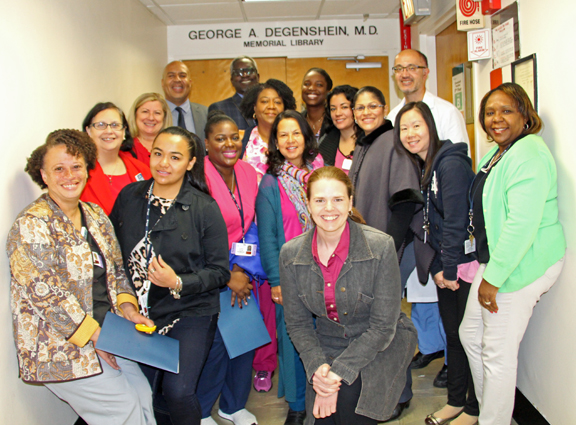An average visit to a doctor at Maimonides’ 9th Avenue Women’s Primary Care Center used to take about three and a half hours. That is no longer the case. Working with consultants from the Labor Management Project (LMP), a process improvement (PI) team was able to cut that time in half.
LMP consultants provided PI training and coaching to the labor and management co-led PI team, using Plan-Do-Study-Act (PDSA) and Lean models. Consultants also trained team members on communication and team building and provided executive coaching to management. With the LMP’s guidance, the PI team clarified roles and responsibilities, created process maps for patient visits, and identified changes to test. According to the site’s medical director, Dr. Ronald Berka, process mapping was an “eye-opening experience” in that it exposed the myriad of steps that patients had to go through during a typical visit.
The 9th Avenue team tested and instituted numerous process changes, including pre-registering patients early in the morning, extending the schedule to decrease overbooking, assigning medical assistants to specific providers, starting the intake process with a patient even if they had not been registered and eliminating 9 am slots for new patients to give clerical staff time to resolve insurance issues.
Jennifer Quevedo, committee co-lead and admitting clerk said of the LMP: “They were very helpful. They provided all the information that we needed and gave us great ideas on how to change.” Lisamarie Alba, co-lead and site administrator added: “The LMP was a big help. We couldn’t have done it without someone from the outside.”
The Center’s patients have been pleased with the noticeable decrease in wait time. Ms. Quevedo reported, “Sometimes patients leave by 9:15 am and they are like, ‘It was so quick today. That never happened before.’”
In addition to decreasing cycle time, the PI work led to long-term improvements in team effectiveness and labor-management collaboration, as shown by a story Ms. Alba and Ms. Quevedo told. One day more than six months after the end of the PI project, all of the clinic’s computer systems were down. Instead of succumbing to chaos, staff pulled together and had a good day because of teamwork and communication. “People who you would have never seen before were coming out to help, and I think that was an outgrowth of this project. It has had a ripple effect. It shows the sustainability of the project,” Ms. Alba remarked.
Download a pdf of this article.
